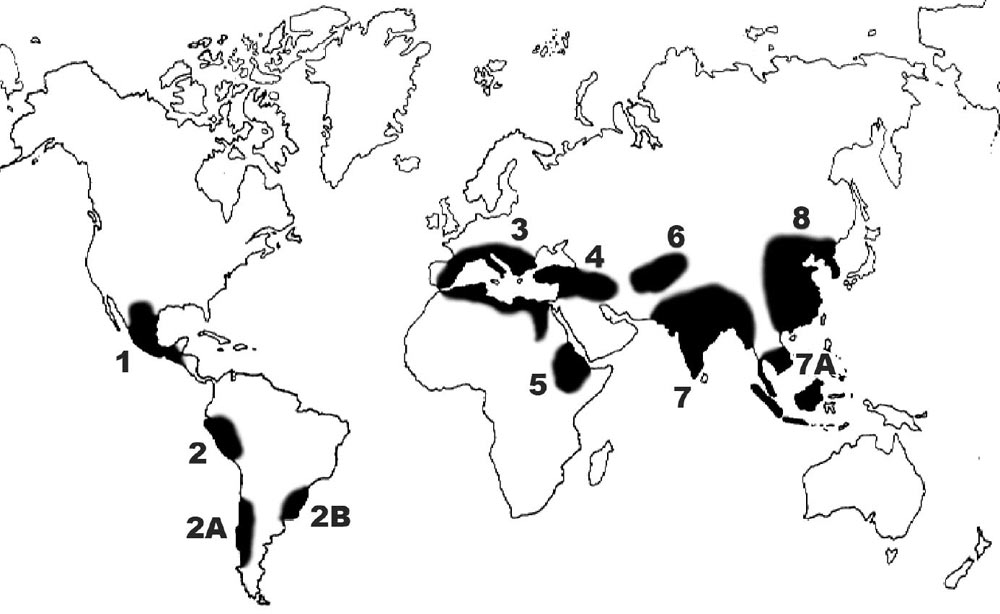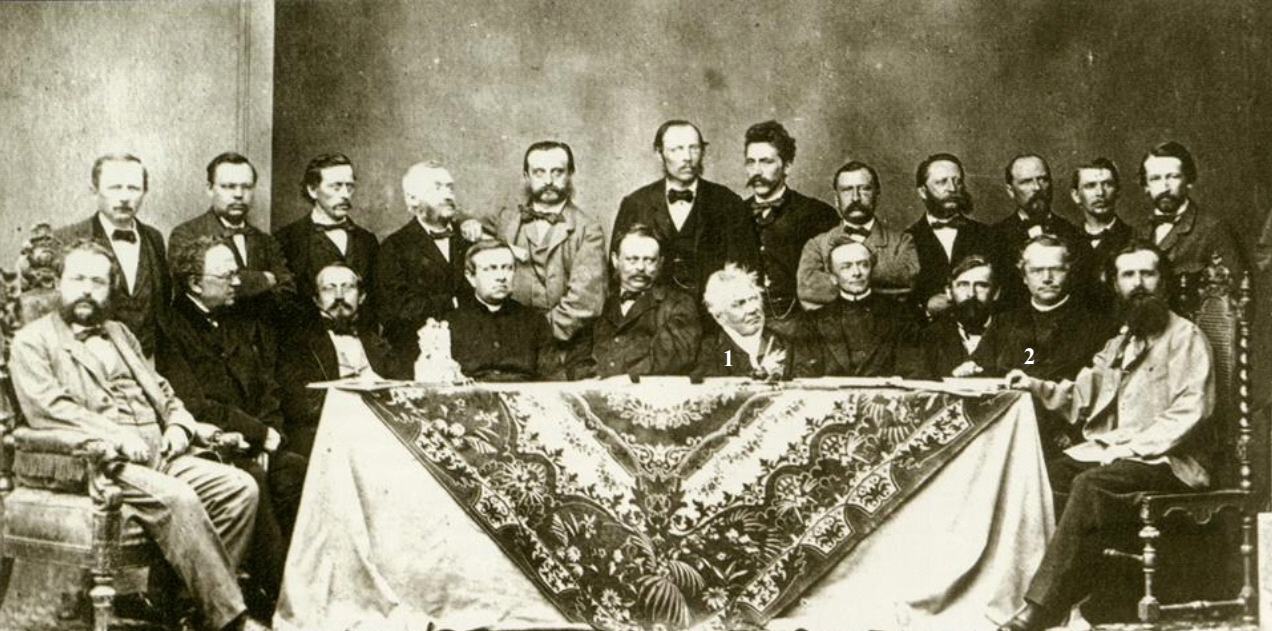|
Lysenkoism
Lysenkoism ( ; ) was a political campaign led by the Soviet biologist Trofim Lysenko against genetics and science-based agriculture in the mid-20th century, rejecting natural selection in favour of a form of Lamarckism, as well as expanding upon the techniques of vernalization and grafting. More than 3,000 mainstream biologists were dismissed or imprisoned, and numerous scientists were executed in the Soviet campaign to Suppressed research in the Soviet Union, suppress scientific opponents. The president of the Soviet Agriculture Academy, Nikolai Vavilov, who had been Lysenko's mentor, but later denounced him, was sent to prison and died there, while Soviet genetics research was effectively destroyed. Research and teaching in the fields of neurophysiology, cell biology, and many other biological disciplines were harmed or banned. The government of the Soviet Union (USSR) supported the campaign, and Joseph Stalin personally edited a speech by Lysenko in a way that reflected his s ... [...More Info...] [...Related Items...] OR: [Wikipedia] [Google] [Baidu] |
Trofim Lysenko
Trofim Denisovich Lysenko (; , ; 20 November 1976) was a Soviet agronomist and scientist.''An ill-educated agronomist with huge ambitions, Lysenko failed to become a real scientist, but greatly succeeded in exposing of the “bourgeois enemies of the people.” From such a “scion” who was “grafted” to the Stalinist totalitarian regime “stock”, impressive results could have been expected—and were indeed achieved.'' He was a proponent of Lamarckism, and rejected Mendelian inheritance, Mendelian genetics in favour of his own idiosyncratic, Pseudoscience, pseudoscientific ideas later termed Lysenkoism. In 1940, Lysenko became director of the Institute of Genetics of the Russian Academy of Sciences, Soviet Academy of Sciences, and he used his political influence and power to suppress dissenting opinions and discredit, marginalize, and imprison his critics, elevating his anti-Mendelian theories to state-sanctioned doctrine. Soviet scientists who refused to renounce gene ... [...More Info...] [...Related Items...] OR: [Wikipedia] [Google] [Baidu] |
VASKhNIL
VASKhNIL (), the acronym for the Lenin All-Union Academy of Agricultural Sciences or the V.I. Lenin Academy of Agricultural Sciences (), was the Soviet Union's academy dedicated to agricultural sciences, operating from 1929 to the dissolution of the Soviet Union in 1992. Built upon the model of the Academy of Sciences of USSR, VASKhNIL included not only a body of academicians but also a vast network of research institutions scattered all over the Union, with thousands of researchers and plant and cattle breeders. History The academy operated from 1929 to the dissolution of the Soviet Union in 1992. In the 1930s–40s, meetings of the academy members ('sessions' of VASKhNIL) provided the floor for debates between Lysenkoists and geneticists. After Trofim Lysenko had taken control over the academy, it became for about thirty years a stronghold of Lysenkoism. The proverbial among Russian biologists (July 31–August 7, 1948) organised under control of the Communist Party ... [...More Info...] [...Related Items...] OR: [Wikipedia] [Google] [Baidu] |
Lamarckism
Lamarckism, also known as Lamarckian inheritance or neo-Lamarckism, is the notion that an organism can pass on to its offspring physical characteristics that the parent organism acquired through use or disuse during its lifetime. It is also called the inheritance of acquired characteristics or more recently soft inheritance. The idea is named after the French zoologist Jean-Baptiste Lamarck (1744–1829), who incorporated the classical era theory of soft inheritance into his theory of evolution as a supplement to his concept of orthogenesis, a drive towards Evolution of biological complexity, complexity. Introductory textbooks contrast Lamarckism with Charles Darwin's theory of evolution by natural selection. However, Darwin's book ''On the Origin of Species'' gave credence to the idea of heritable effects of use and disuse, as Lamarck had done, and his own concept of pangenesis similarly implied soft inheritance. Many researchers from the 1860s onwards attempted to find evidence ... [...More Info...] [...Related Items...] OR: [Wikipedia] [Google] [Baidu] |
Suppressed Research In The Soviet Union
Many fields of scientific research in the Soviet Union were banned or suppressed with various justifications. All humanities and social sciences were tested for strict accordance with dialectical materialism. These tests served as a cover for political suppression of scientists who engaged in research labeled as "idealistic" or "bourgeois".Loren R. Graham (2004). ''Science in Russia and the Soviet Union. A Short History.'' Series: Cambridge Studies in the History of Science. Cambridge University Press. Many scientists were fired, others were arrested and sent to Gulags. The suppression of scientific research began during the Stalin era and continued after his death. The ideologically motivated persecution damaged many fields of Soviet science.Mark Walker (2002) ''Science and Ideology. A Comparative History''. Series: Routledge Studies in the History of Science, Technology and Medicine. Routledge. Examples Biology In the mid-1930s, the agronomist Trofim Lysenko start ... [...More Info...] [...Related Items...] OR: [Wikipedia] [Google] [Baidu] |
Nikolai Vavilov
Nikolai Ivanovich Vavilov ( rus, Никола́й Ива́нович Вави́лов, p=nʲɪkɐˈlaj ɪˈvanəvʲɪtɕ vɐˈvʲiləf, a=Ru-Nikolay_Ivanovich_Vavilov.ogg; – 26 January 1943) was a Russian and Soviet Union, Soviet agronomist, botanist and geneticist who identified the Vavilov Center, centers of origin of Horticulture, cultivated plants. His research focused on plant breeding, improvement of wheat, maize and other Cereal, cereal crops. Vavilov became the youngest member of the Academy of Sciences of the Soviet Union. He was a member of the USSR Supreme Soviet of the Soviet Union, Central Executive Committee, a recipient of the Lenin Prize, and president of All-Union Geographical Society. He was a fellow of the Royal Society and of the Royal Society of Edinburgh. Vavilov's work was criticized by Trofim Lysenko, whose anti-Mendelian inheritance, Mendelian concepts of plant biology had won favor with Joseph Stalin. As a result, Vavilov was arrested and subseq ... [...More Info...] [...Related Items...] OR: [Wikipedia] [Google] [Baidu] |
Mendelian Genetics
Mendelian inheritance (also known as Mendelism) is a type of biological inheritance following the principles originally proposed by Gregor Mendel in 1865 and 1866, re-discovered in 1900 by Hugo de Vries and Carl Correns, and later popularized by William Bateson. These principles were initially controversial. When Mendel's theories were integrated with the Boveri–Sutton chromosome theory of inheritance by Thomas Hunt Morgan in 1915, they became the core of classical genetics. Ronald Fisher combined these ideas with the theory of natural selection in his 1930 book '' The Genetical Theory of Natural Selection'', putting evolution onto a mathematical footing and forming the basis for population genetics within the modern evolutionary synthesis. History The principles of Mendelian inheritance were named for and first derived by Gregor Johann Mendel, a nineteenth-century Moravian monk who formulated his ideas after conducting simple hybridization experiments with pea plants ... [...More Info...] [...Related Items...] OR: [Wikipedia] [Google] [Baidu] |
Soviet Union
The Union of Soviet Socialist Republics. (USSR), commonly known as the Soviet Union, was a List of former transcontinental countries#Since 1700, transcontinental country that spanned much of Eurasia from 1922 until Dissolution of the Soviet Union, it dissolved in 1991. During its existence, it was the list of countries and dependencies by area, largest country by area, extending across Time in Russia, eleven time zones and sharing Geography of the Soviet Union#Borders and neighbors, borders with twelve countries, and the List of countries and dependencies by population, third-most populous country. An overall successor to the Russian Empire, it was nominally organized as a federal union of Republics of the Soviet Union, national republics, the largest and most populous of which was the Russian SFSR. In practice, Government of the Soviet Union, its government and Economy of the Soviet Union, economy were Soviet-type economic planning, highly centralized. As a one-party state go ... [...More Info...] [...Related Items...] OR: [Wikipedia] [Google] [Baidu] |
Gregor Mendel
Gregor Johann Mendel Order of Saint Augustine, OSA (; ; ; 20 July 1822 – 6 January 1884) was an Austrian Empire, Austrian biologist, meteorologist, mathematician, Augustinians, Augustinian friar and abbot of St Thomas's Abbey, Brno, St. Thomas' Abbey in Brno (Brünn), Margraviate of Moravia. Mendel was born in a Sudeten Germans, German-speaking family in the Austrian Silesia, Silesian part of the Austrian Empire (today's Czech Republic) and gained posthumous recognition as the founder of the modern science of genetics. Though farmers had known for millennia that crossbreeding of animals and plants could favor certain desirable trait (biological), traits, Mendel's pea plant experiments conducted between 1856 and 1863 established many of the rules of biological inheritance, heredity, now referred to as the laws of Mendelian inheritance. Mendel worked with seven characteristics of Pea, pea plants: plant height, pod shape and color, seed shape and color, and flower position and c ... [...More Info...] [...Related Items...] OR: [Wikipedia] [Google] [Baidu] |
Lysenko With Stalin
Lysenko (; ; Lysienka) or Lisenko is a Ukrainian surname. It most often refers to: * Mykola Lysenko (1842–1912), Ukrainian composer, after whom the Lysenko music school and Lysenko State Conservatory are named. * Trofim Lysenko (1898–1976), Soviet agronomist, politician and scientist, after whom the term Lysenkoism was named. Other notable people with this surname include: Sports * Alla Lysenko (born 1969), Ukrainian Paralympic rower * Anastasiya Lysenko (born 1995), Ukrainian weightlifter * Anna Lysenko (born 1991), Ukrainian boxer * Dmytro Lysenko (born 1981), Ukrainian diver * Lyudmila Lysenko (biathlete) (born 1973), Belarusian biathlete * Ruslan Lysenko (born 1976), Ukrainian biathlete * Tatiana Lysenko (born 1975), Soviet and Ukrainian gymnast * Tatyana Lysenko (born 1983), Russian hammer thrower Football * Oleksandr Lysenko (born 1956), Soviet-Ukrainian footballer *Sergei Lysenko (footballer, born 1972) Sergei Mikhailovich Lysenko (; born 24 August 1972) is ... [...More Info...] [...Related Items...] OR: [Wikipedia] [Google] [Baidu] |
Vernalization
Vernalization () is the induction of a plant's flowering process by exposure to the prolonged cold of winter, or by an artificial equivalent. After vernalization, plants have acquired the ability to flower, but they may require additional seasonal cues or weeks of growth before they will actually do so. The term is sometimes used to refer to the need of herbal (non-woody) plants for a period of cold dormancy in order to produce new shoots and leaves, but this usage is discouraged. Many plants grown in temperate climates require vernalization and must experience a period of low winter temperature to initiate or accelerate the flowering process. This ensures that reproductive development and seed production occurs in spring and winters, rather than in autumn. The needed cold is often expressed in chill hours. Typical vernalization temperatures are between 1 and 7 degrees Celsius (34 and 45 degrees Fahrenheit). For many perennial plants, such as fruit tree species, a period of col ... [...More Info...] [...Related Items...] OR: [Wikipedia] [Google] [Baidu] |
Science In The People's Republic Of China
Science and technology in the People's Republic of China have developed rapidly since the 1980s to the 2020s, with major scientific and technological progress over the last four decades. From the 1980s to the 1990s, the government of the People's Republic of China successively launched the 863 Program and the "Strategy for Rejuvenating the Country through Science and Education", which greatly promoted the development of China's science and technological institutions. Governmental focus on prioritizing the advancement of science and technology in China is evident in its allocation of funds, investment in research, reform measures, and enhanced societal recognition of these fields. These actions undertaken by the Chinese government are seen as crucial foundations for bolstering the nation's socioeconomic competitiveness and development, projecting its geopolitical influence, and elevating its national prestige and international reputation. As per the Global Innovation Index i ... [...More Info...] [...Related Items...] OR: [Wikipedia] [Google] [Baidu] |
Gene
In biology, the word gene has two meanings. The Mendelian gene is a basic unit of heredity. The molecular gene is a sequence of nucleotides in DNA that is transcribed to produce a functional RNA. There are two types of molecular genes: protein-coding genes and non-coding genes. During gene expression (the synthesis of Gene product, RNA or protein from a gene), DNA is first transcription (biology), copied into RNA. RNA can be non-coding RNA, directly functional or be the intermediate protein biosynthesis, template for the synthesis of a protein. The transmission of genes to an organism's offspring, is the basis of the inheritance of phenotypic traits from one generation to the next. These genes make up different DNA sequences, together called a genotype, that is specific to every given individual, within the gene pool of the population (biology), population of a given species. The genotype, along with environmental and developmental factors, ultimately determines the phenotype ... [...More Info...] [...Related Items...] OR: [Wikipedia] [Google] [Baidu] |






